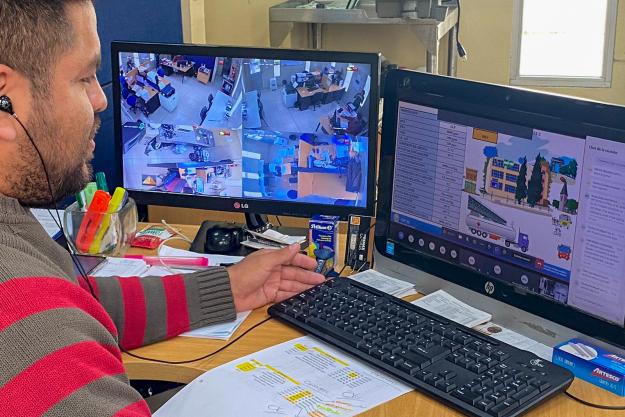
THE HAGUE, Netherlands — 11 October 2021 — The Organisation for the Prohibition of Chemical Weapons (OPCW) assisted emergency First Responders from Latin America and the Caribbean (GRULAC) in developing skills to handle emergency management tools – the Wireless Information System for Emergency Responders (WISER) and the Emergency Response Guidebook (ERG). The live online training, conducted from 4 to 8 October, benefited from the expertise of lecturers from Ecuador and Spain secured through the OPCW Instructor Development and Exchange Programme, as well as Technical Secretariat staff.
This online course has also been run with great success in several regions and it is the third time it has been offered for the GRULAC region since the pandemic began. The course was developed in response to Member States’ strong interest in building and developing skills to manage chemical incidents.
Hazardous material specialist and lieutenant of the Fire Department of the Metropolitan District of Quito, Mr Christian Daniel Benalcazar Proaño, the instructor from Ecuador, stated: “All first responders, regardless of their civil or military status, must be prepared to respond to an incident involving chemical warfare agents, and training is the cornerstone of a good response.”
The OPCW’s Special Advisor on Assistance and Protection, Mr Shawn DeCaluwe, remarked: “Delivering this type of chemical emergency management courses for first responders in the different geographic regions shows the global interest in the topic, and the efforts of the Technical Secretariat in further implementing Article X of the Convention and providing support to Member States to reinforce their response capacity.”
The course provided both theoretical knowledge and practical exercises on the use of the ERG and WISER systems in chemical emergencies. Live instruction was supplemented by a wealth of reference materials, including presentations, videos, and documents.
The participants included 73 military and civilian professionals from a range of response systems, including civil defence, fire departments, police, as well as Chemical, Biological, Radiological and Nuclear (CBRN) defence military units, representing the following 14 OPCW Member States: Argentina, Bahamas, Barbados, Brazil, Chile, Colombia, Costa Rica, Ecuador, El Salvador, Guatemala, Honduras, Mexico, Peru and Uruguay.
Background
This was the tenth online course for the OPCW Member States from Latin America and the Caribbean (GRULAC) since the onset of the Covid-19 pandemic, organised in support of the full and effective implementation of Article X (Assistance and Protection) of the Chemical Weapons Convention.
As the implementing body for the Chemical Weapons Convention, the OPCW, with its 193 Member States, oversees the global endeavour to permanently eliminate chemical weapons. Since the Convention’s entry into force in 1997, it is the most successful disarmament treaty eliminating an entire class of weapons of mass destruction.
Over 98% of all declared chemical weapon stockpiles have been destroyed under OPCW verification. For its extensive efforts in eliminating chemical weapons, the OPCW received the 2013 Nobel Peace Prize.
